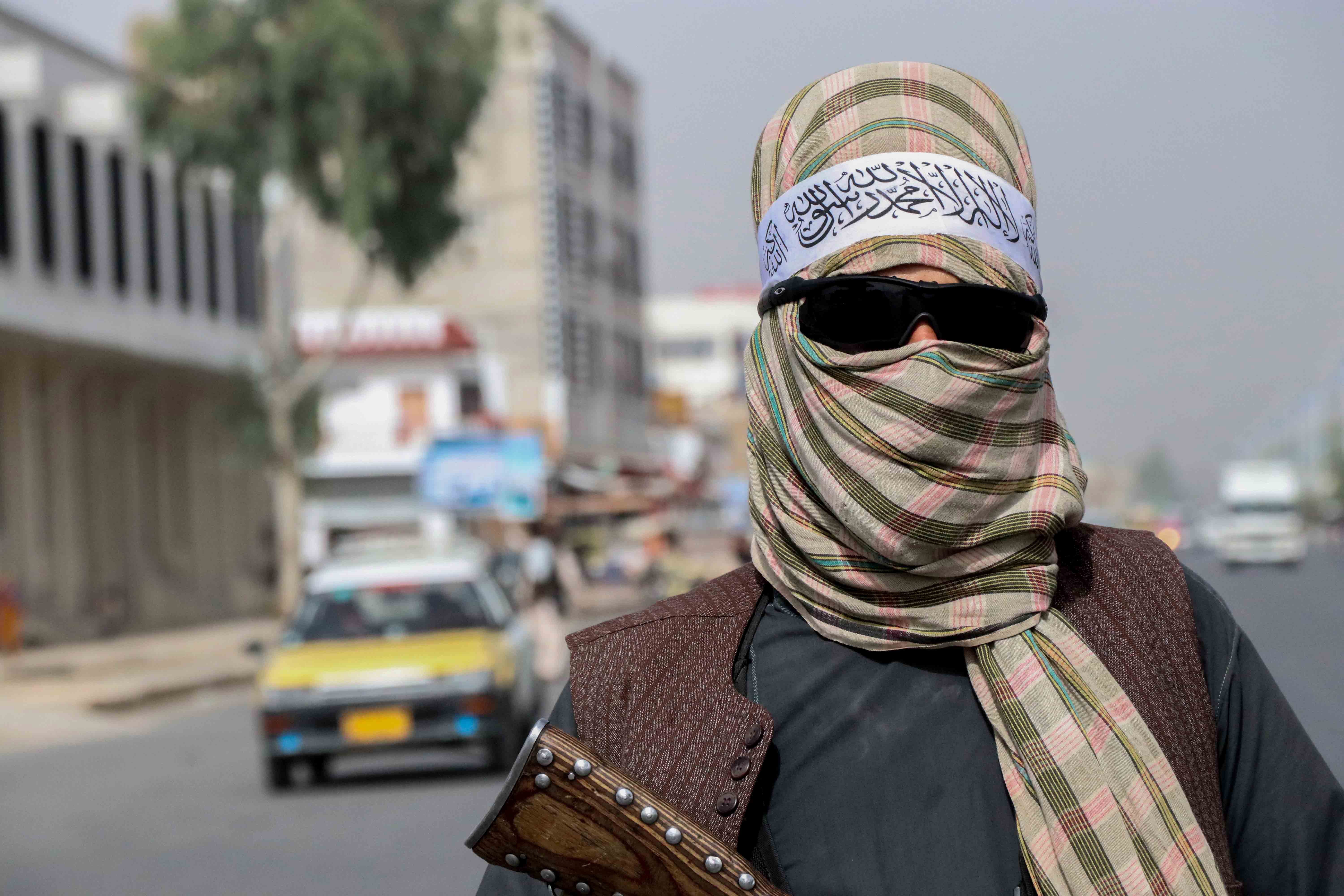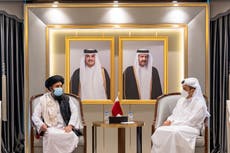Where do the Taliban get their money and weapons from?
The Taliban have built a financial empire, but it could be thinly stretched as they become the Afghan government
The swift Taliban military onslaught that saw the militant group take over the whole of Afghanistan in a matter of weeks revealed how wealthy it has become since the ousting of its regime in 2001.
In the past two decades, the insurgents have run a state-like economy in the areas they controlled. They relied on various fundraising sources, such as drug trafficking and other criminal activities, extortion and taxes, charitable donations and foreign assistance.
Follow Afghanistan news live: Latest updates
“The Taliban operates a classic ‘territory controlling’ financial model; in other words, it earns the bulk of its funds from the people and businesses in areas that it controls,” Tom Keatinge, Director of the Centre for Financial Crime and Security Studies at the Royal United Services Institute in London, told The Independent.
It remains almost impossible to project precisely how much the Taliban raise every year. However, according to a recent UN report, the group manage to collect from £220 million to £1.17 billion every year.
The most well-documented source of income for the Taliban is the trade of opium hashish, methamphetamines and other narcotics.
“The Taliban have a very diverse portfolio in criminal enterprise and ‘front companies’. The primary source is narcotics, both heroin and synthetic drugs,” said Sajjan Gohel, international security director at the Asia-Pacific Foundation and a visiting teacher at the London School of Economics in London.
The Taliban earns the bulk of its funds from the people and businesses in areas that it controls
For years, Afghanistan provided around 84 per cent of the global opium production, according to the UN World Drug Report 2020. Taliban commanders have imposed a tax over every stage of opium’s production, transportation and selling.
The Taliban designed a tax system in the areas under its control, including companies, shopkeepers, trucks using motorways and international aid projects. They also collect a 10 per cent “Ushur” Islamic tax and a 2.5 per cent “Zakat” – the Islamic annual tax on wealth.
Last year, a classified Nato report published by Radio Free Europe/Radio Liberty cited a senior Taliban figure, Mullah Yaqoob, as estimating the group took around £117 million in taxes.
“We use the term taxation here, but what we really mean is extortion… This is not a normal taxation system - it is much more like racketeering enterprise,” Laurel Miller, director of the Asia programme at the International Crisis Group, told BBC Radio 4’s The Briefing Room.
Asked about the sources of the Taliban massive amounts of arms, she said: “Afghanistan is a place, after decades of war, awash in weapons. It is not difficult to get weapons.”
But the highest Taliban income comes from moving legal goods, such as fuel, food, medicine and essentials, through border crossings and customs.
Last month, the Afghan Finance Ministry spokesman Rafiullah Tabeh said that the previous government generated an estimated £66.5 million worth of revenue through customs until May. But as the Taliban rampage went on, more key border crossings have fallen. The government revenues in June, therefore, plummeted to £41.5 million.
A Taliban spokesperson said that the routine work of the US-built Sher Khan Bandar border crossing, a crucial gateway to Tajikistan in Kunduz Province, will continue as before: “the reason is that we don’t want to create problems for businessmen, for traders, for common people”.
Official figures showed that more than £1.46 billion in trade passed through the three Afghan border crossings with Iran last year. However, a study by the Overseas Development Institute said that informal trade would make this figure twice as high.
“Drug trafficking and border crossings will continue to be the main income source for the Taliban, but as they are taking control of most of Afghanistan, the Taliban will want to exploit and cultivate the nation’s natural mineral resources,” Gohel noted.

“It will be looking for partners to help in this, and China and Pakistan are the most likely suitors to support them in this,” he said.
Mining has also been a prime source of income for the group. The UN report, and NATO, estimate that the Taliban generated nearly £340 million from the mining sector every year.
But other countries wouldn’t help the Taliban through trade or boosting the mining sector only, but their support includes direct funding as well.
The US and its allies have long accused specific countries, such as Pakistan, Iran and Russia, of funding and arming the radical group and providing a safe haven for Taliban leaders. These countries vehemently deny these accusations.
Nonetheless, experts have repeated that individuals from Pakistan, Saudi Arabia and other Gulf countries can be considered a lucrative source of funds for the Taliban. The BBC has estimated that charitable contributions by these individuals could be as much as £365m a year.
“The Taliban will continue to rely on their networks in Pakistan as that is their primary route and source of incoming revenue,” Gohel told The Independent.
But after their stunning takeover of Kabul last weekend, the Taliban now face the precarious situation of dealing with the crumbling Afghan economy, which was kept on life support by foreign aid. The World Bank has confirmed that foreign powers cover almost 75 per cent of the Afghan government spending by sending nearly £3 billion to Kabul every year.
Despite the shambolic economic situation, the Taliban’s control over the whole country would likely boost their coffers and provide greater financial autonomy from their foreign patrons.
“Any organisation like the Taliban will want to limit its financial vulnerability, so it will maximise the extent to which it can fund its activities from resources within its control,” Keatinge said.
“However, it will be worth watching which foreign governments are sympathetic towards them, recognise their legitimacy and, potentially, develop trade or other economic ties with the new regime.”
International legitimacy seems to have become the ultimate goal for any future Taliban government. In addition to allowing Taliban officials to participate in international meetings with world leaders, it would guarantee the flow of international aid, which is essential to prop up their rule.
The group’s commanders have been out of government for 20 years and many of them may have lost touch with governing the daily life of a nation in despair.
The new reality will require additional funds as the group seeks to win the hearts and minds of the highly sceptical Afghans.
“There is a potential risk for the Taliban, however, which is that they are no longer opposing the national government; they are – in effect – the national government, and thus this requires them to fund and maintain many of the services the previous government provided,” Keatinge said.
The Taliban will continue to rely on their networks in Pakistan as that is their primary route and source of incoming revenue
This is the ultimate test facing the western powers who have taken part in ousting the previous Taliban regime. In the US, for example, about $7 billion of the Afghan central bank’s $9 billion in foreign reserves are still being held by the Federal Reserve Bank of New York, according to the former acting governor of the Afghan central bank.
The Biden administration has already vowed to block access to these funds. The International Monetary Fund also said it would withhold more than $400 million, previously scheduled to be sent to Afghanistan.
“I fear that in all of this, those that will suffer will be those that have relied on international humanitarian funds – this could be the lasting legacy of the collapse of the Afghan government in the past week,” Keatinge said.
“The international community is now in a bind. They must not recognise or legitimise the Taliban militia and continue to find ways to cut off their clandestine funding streams as that can contribute to funding terrorism,” Gohel told The independent.
“There is also a need to continue to enable UN organisations and NGOs to work at a grassroots level to ensure humanitarian support is sustained in Afghanistan,” he added
“The people of Afghanistan must not fall victim to the mercy of the Taliban.”



Join our commenting forum
Join thought-provoking conversations, follow other Independent readers and see their replies
Comments